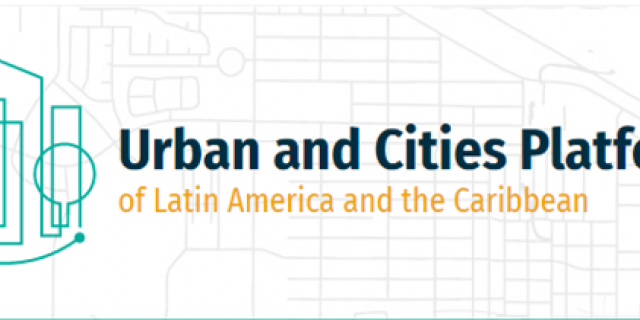The remarkable growth of the Caribbean urban population in recent decades[1] presents both challenges and opportunities for resilience building and sustainable development. This recent urbanization process has been associated with greater inequalities, expansion of informal settlements and inadequate housing, collaborating to widen the urban divide.[2]
In response to strategic sustainable urbanization efforts in the Caribbean and effective implementation of SDG 11, “Make cities and human settlements inclusive, safe, resilient and sustainable”, the Subregional Action Plan for the implementation of the New Urban Agenda (NUA), identified a set of guidelines and priorities. Action areas identified for the Caribbean-specific objectives are: 1) National Urban Policies; 2) Urban legal frameworks; 3) Urban and territorial planning and design; 4) Financing urbanization; 5) Local implementation; and 6) monitoring framework and mechanisms for follow-up.
The Subregional Action Plan seeks synergies with existing global agreements and agendas beyond the NUA and the SDGs, including the SAMOA pathway, the Sendai Framework for Disaster Risk Reduction, the Addis Ababa Action Agenda of the Third International Conference on Financing for Development, and the Paris Agreement. The Subregional Action Plan was developed by ECLAC, UN-Habitat, and the subregional representatives of Ministers and High-Level Authorities of Housing and Urban Development in Latin America and the Caribbean (MINURVI), with the participation of diverse urban Caribbean stakeholders who make up the Caribbean Working Group (CWG) for the implementation of the NUA.
In the current context, the COVID-19 pandemic has highlighted the decisive role of integrated approaches and collaboration across levels of government and subnational jurisdictions[3] to address the multidimensional and differentiated impacts of socio-economic and health related shocks, as well as the importance of local governments as front-line responders in crisis response, recovery and rebuilding.
Furthermore, digital acceleration resulting from pandemic lockdown measures, presents opportunities in terms of e-governance and evidence based approaches, with increased application of digital technologies providing real-time data on the performance of local and national level administrations, monitoring vulnerability factors and inform conducive urban policies and actions that alongside with vulnerability reduction, create conditions for inclusive prosperity and resilience, improving sustainable solutions, participatory processes, enhancing efficiencies in basic service provision, local governance and management, emergency response, etc.[4]
The efforts made by Caribbean countries to accelerate progress in the areas of e-learning, business, telemedicine, and strategic deployment of technology is thus increasingly enabling communities to receive information and have access to emergency response in the current context, while in the longer term it offers tremendous potential to drive economic development and social equality.
Smart city integrated approaches based on inclusive planning, efficient and equitable provision of basic services and the promotion of sustainable development practices, can be a formidable tool to address growing urbanization challenges and leverage the opportunity of resilient, well planned and managed urbanization as an important priority for Caribbean countries and territories.
Objectives
In this discussion, we would like to bring relevant stakeholders together to:
- Introduce the Regional Urban and Cities Platform
- Introduce geospatial digital tools which can be utilized to assess and measure spatial vulnerability factors that may hinder social inclusive development and promote spatial segregation undermining the prosperity of cities
- Discuss issues of policy integration, having in mind the COVID-19 response priorities as well as other subregional priorities such as those considered in the NUA and its Subregional Action Plan
The discussion will result in a set of concrete recommendations which will be introduced to MINURVI and integrated in the process leading up to the Regional Conference on Social Development to be held in October, hosted by Antigua and Barbuda.
Format
The following questions will be addressed during the discussion:
- How can the Caribbean subregion effectively engage on issues of territorial vulnerabilities and sustainable urbanization and advance on common issues of interest? Could digital tools be used to more effectively direct engagement of national and subnational stakeholders? If so, how can this dialogue and exchange be channeled?
- In the longer term, how can Caribbean countries collaborate more effectively on the development and incremental improvement of data systems, digital tools and technologies?
- As natural and climate related disasters tend to occur more frequently, what opportunities arise for strengthening cooperation between Housing and Social Development Ministries to assess common goals? More precisely, when operating on the ground, how to enhance synergies between social protection and housing services? Are current institutional frameworks adapted to deal and transition from attending immediate needs linked to the emergency, while preparing for a more sustainable and resilient reconstruction process?
- What can be the concrete next steps in making this collaboration possible? Is it possible to promote a package of tools that help stakeholders address territorial challenges, particularly in relation to mapping and participatory processes in the Caribbean?
[1] UN-DESA (2018), World Urbanization Prospects: The 2018 Revision.
[2] ECLAC (2018), Implementation of the Montevideo consensus on population and development in the Caribbean: a review of the period 2013 – 2018.
[3] ECLAC (2020), Planning for resilience: an integrated approach to tackle climate change in the Caribbean.
[4] ECLAC (2020), Building a New Future: Transformative Recovery with Equality and Sustainability.
